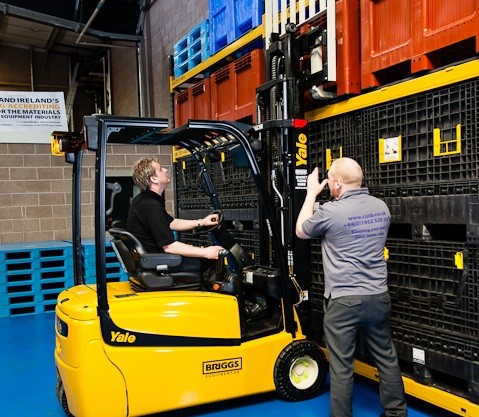Overall accident rates tend to be lower in workplaces where the wider workforce participates in health and safety. So, to reduce the risk of incidents, it’s important for lift truck operators to understand their role in health and safety and feel they can actively contribute.

Forklifts are commonplace in logistics and warehouse operations, yet they are dangerous. For this reason, your forklift operators may be some of the best positioned employees to understand workplace risks and should be encouraged an active role in improving health and safety.
Here’s how you can help lift truck operators engage in health and safety conversations.
- Communicate the impact of incidents
Create a culture where incidents are never just an inevitable part of the job and where operators have a clear awareness of the potential impacts of a lift truck incident (which can include life-changing and fatal injuries).
Ensure that operators understand the possible fines should an incident occur. While this does not come out of their pocket, in a worst-case scenario, it could leave them out of a job.
Tackle these subjects with two-way blame-free communication between trainers, health and safety managers, compliance managers, and their lift truck operators.
This may differ depending on your organisation’s size and culture. However, a lift truck operator training environment is a good place to have these conversations.
- Educate on the role of Managers and Supervisors
Incidents often occur due to poor or non-existent supervision, so those in these senior roles must be correctly trained, just as operators must be.
However, make your operators aware that they have a level of accountability and therefore must always operate to the safety standards delivered via their lift truck operator training and follow the organisation’s rules and processes around health and safety.
- Be transparent about legal obligations
Do your operators have any idea of what you have to do for health and safety compliance? Although compliance and legislation are covered in operator training (to a degree), many will be unaware of the extent of requirements. So, you may find being transparent with operators about this positively changes their view on the importance on health and safety.
- It all starts with training
Remember that for compliance and safety, lift truck training should always be the first step. It is vital for educating operators on how to use and work around lift trucks and reduce risks to themselves and others.
There is a mandatory level of lift truck operator training required for compliance, and this should be kept up to date with refresher training or conversion training (as required).
RTITB Accreditation could support safety in your operation
RTITB Accreditation for workplace transport operations can help businesses delivering training in-house to improve standards, safety, and compliance.
For instance, RTITB Accreditation includes an annual materials handling equipment training and operations compliance HealthCheck at no extra cost, helping businesses to reduce risk and improve health and safety.
Approaches to managing the risks associated Musculoskeletal disorders
In this episode of the Safety & Health Podcast, we hear from Matt Birtles, Principal Ergonomics Consultant at HSE’s Science and Research Centre, about the different approaches to managing the risks associated with Musculoskeletal disorders.
Matt, an ergonomics and human factors expert, shares his thoughts on why MSDs are important, the various prevalent rates across the UK, what you can do within your own organisation and the Risk Management process surrounding MSD’s.


